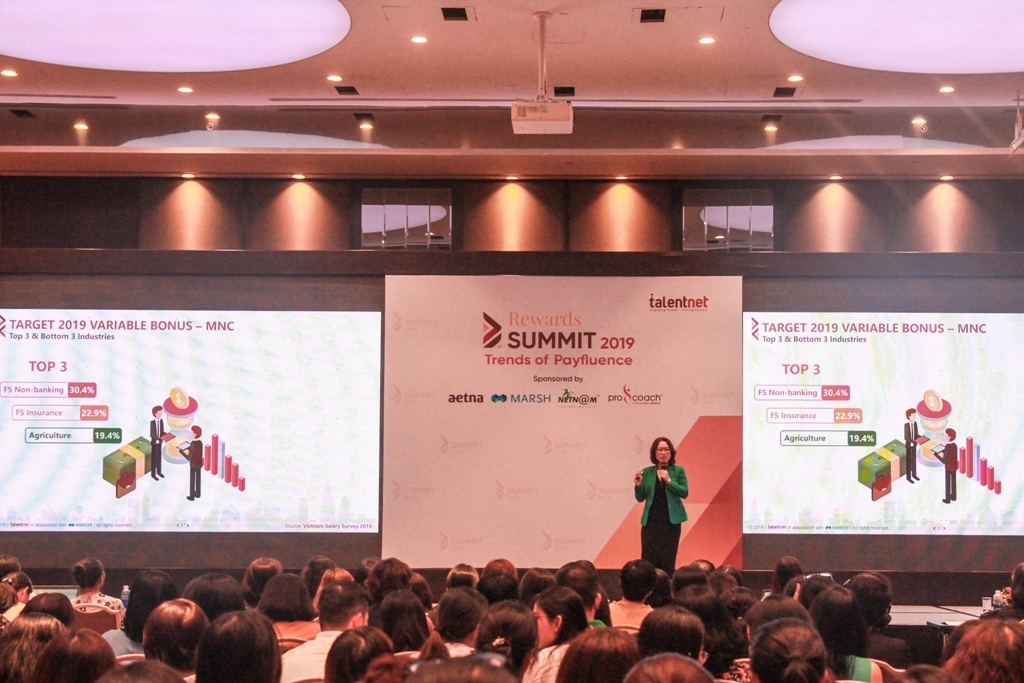Local companies offer 29 per cent lower salary than multinationals
 |
| Under the theme 'Trends of Payfluence", Vietnam Rewards Summit 2019 attracts over 600 business leaders and HR professionals in Vietnam and beyond |
This information was shared at Vietnam Rewards Summit 2019 – the country’s first and largest conference focusing on the fields of total rewards and remuneration, organised by Talentnet Corportion. It is based on the results of the 2019 Talentnet-Mercer Total Remuneration Survey, which attracted the participation of 605 renowned multinational companies and local conglomerates from 16 different industries like high tech, consumer goods, chemical life sciences, and manufacturing.
According to the survey, the gap is much wider at the management level as multinational companies have been focusing on offering higher salary to management positions to fairly compensate for their larger contribution and scope of work.
However, from another perspective, the forecasted variable bonus rate of Vietnamese companies this year is higher than that of multinational companies (22.6 per cent compared to 17.5 per cent). These figures show that local companies are willing to be more flexible in pay and bonuses to compete with multinational companies in the war for talents.
Due to the nature of their business, companies in financial services including non-banking and insurance have the highest bonus rates at 30.4 and 22.9 per cent, respectively, compared to the annual base salary. In particular, 2019 records a remarkable increase in the bonus rate of the agricultural sector (19.4 per cent). Meanwhile, logistics, retail, and education have the lowest bonus rates of 13.8, 14.8, and 15.4 per cent.
 |
| Experts shed light on how to design a game-changing rewards strategy strongly linked to business objectives and organsation values |
The report also points out that the salary increase rate in 2019 was 8.6 per cent (multinational companies), and 8.9 per cent (local businesses) with no significant difference compared to last year’s results. Frankly, the increase is still higher than Vietnam’s current rate of inflation and GDP growth.
High tech, chemicals, and trading are the top three industries providing the highest rates of salary increase, with 10.2, 9, and 8.6 per cent in this order. On the other hand, industries like oil and mining, education, and financial services-banking report the lowest salary increase rates at 4.5, 6.6, and 6.9 per cent.
With remuneration data from over 342,000 employees across Vietnam, the 2019 Talentnet-Mercer survey continues to be the largest and most comprehensive salary and remuneration report in Vietnam over the past 10 years. In particular, this year’s survey marks the impressive attendance of 62 domestic enterprises, mainly from the consumer goods, real estate, and banking industries.
This investment shows a high level of interest amongst Vietnamese businesses in customising and professionalising the remuneration programme, keeping up with the market trends, while improving the talent attraction and retention capabilities, especially amidst the increasingly competitive business climate nowadays.
According to Nguyen Thi Thanh Huong, Deputy CEO of Talentnet, the significant increase of participating companies in the salary survey this year reflects the huge demand of businesses for an official and reliable database to benchmark their current rewards systems with that of the market, maximise the use of Human Resources budgets, and build an effective remuneration system to attract talents and enhance the company’s competitive edge.
Besides, the salary report will be a valuable source of information for CEOs and HR leaders in making informed business development as well succession planning decisions.
What the stars mean:
★ Poor ★ ★ Promising ★★★ Good ★★★★ Very good ★★★★★ Exceptional
Related Contents
Latest News
More News
- VNPAY and NAPAS deepen cooperation on digital payments (February 11, 2026 | 18:21)
- Vietnam financial markets on the rise amid tailwinds (February 11, 2026 | 11:41)
- New tax incentives to benefit startups and SMEs (February 09, 2026 | 17:27)
- VIFC launches aviation finance hub to tap regional market growth (February 06, 2026 | 13:27)
- Vietnam records solid FDI performance in January (February 05, 2026 | 17:11)
- Manufacturing growth remains solid in early 2026 (February 02, 2026 | 15:28)
- EU and Vietnam elevate relations to a comprehensive strategic partnership (January 29, 2026 | 15:22)
- Vietnam to lead trade growth in ASEAN (January 29, 2026 | 15:08)
- Japanese business outlook in Vietnam turns more optimistic (January 28, 2026 | 09:54)
- Foreign leaders extend congratulations to Party General Secretary To Lam (January 25, 2026 | 10:01)

 Tag:
Tag:




















 Mobile Version
Mobile Version